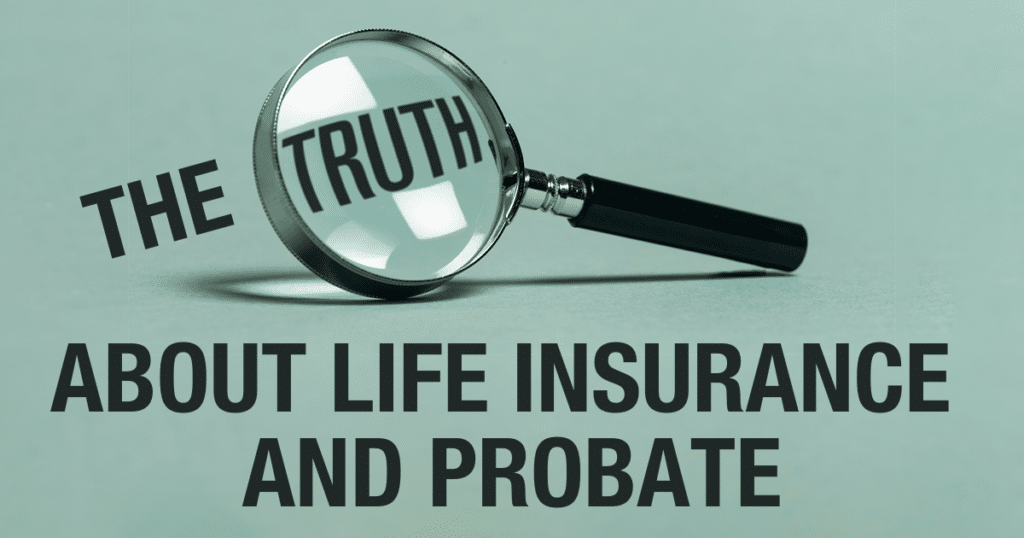
Upon someone’s death, their estate may need to go through probate. Not all property is subject to probate, and families who know their loved one had a life insurance policy may wonder if probate is needed to obtain life insurance proceeds. Entering probate could add more stress to an already difficult situation. It means waiting longer to claim the payment, possibly ending up with much less money than expected, and potentially having a conflict with family members about a distribution.
In this article, we explain when life insurance goes through probate and what to expect if you are the beneficiary of a policy that is claimed to be a probate asset.
Is Life Insurance Subject to Probate?
Usually, a life insurance policy is considered a non-probate asset and does not need to go through probate.
For instance, if a life insurance policy has a designated beneficiary and the beneficiary outlives the policyholder, the policy benefits will not go through probate, since it is not part of the decedent’s estate. Instead, the death benefit should be paid directly to the beneficiary.
When a life insurance policy has a designated beneficiary the insurance company has a legal obligation to pay it to the named beneficiary, and the beneficiary has no obligation to cover the decedent’s debts.
The Estate is the Policy Beneficiary
However, if the beneficiary is his or her estate, the life insurance payout becomes part of the estate and has to go through probate along with the other estate assets. This means that creditors will have access to it should the policyowner have debts at the moment of their passing. As mentioned above, bills and taxes have to be paid first and the rest will be distributed to the intended beneficiaries.
The Primary Beneficiary Has Died
When applying for life insurance, individuals are encouraged to name more than one beneficiary – multiple primary or contingent beneficiaries. If a primary beneficiary dies before the insured, the benefit will go to the contingent beneficiary. If one primary beneficiary dies before the insured, the life insurance policy payout is split among the remaining primary beneficiaries.
If no primary beneficiaries survive, the benefits will go to the contingent beneficiaries and, again, does not need to pass through probate court.
All Policy Beneficiaries Have Died
If however both primary and contingent beneficiaries predecease the policy owner, the life insurance money will become part of the decedent’s estate, thus, go through probate court. Issues with life insurance benefits often lead to beneficiary disputes and disputes with the insurance company. If you are facing such troubles, call Thomas Thompson at (850) 386-5777 for a free case evaluation.
There is No Beneficiary Named on the Designation
If the policyowner fails to complete a beneficiary designation form, the life insurance proceeds will be dealt with the same way as if all named beneficiaries have died: the money will either enter the estate and become available to creditors or be divided among close relatives based on intestacy laws, safe from creditors.
The Life Insurance Beneficiary Is a Minor Child
Naming a minor child as the beneficiary of a life insurance policy poses certain challenges. Children cannot take legal ownership of the death benefit unless certain preventive measures, such as a custodial account or appointing a guardian, are set in place. Our lawyers discuss this at great length in our article about what happens if the life insurance beneficiary is a minor. Usually, a minor child’s benefit from a life insurance policy is placed into a special account that becomes available when a child turns 18.
The Policyowner Failed to Change Beneficiaries After Divorce
Handling life insurance during divorce can be confusing without expert legal advice.
Some states have laws that automatically revoke an ex-spouse’s rights to life insurance after divorce. If the former spouse is the sole primary beneficiary of the policy and the insured did not update the designation upon divorce, the policy may be left without a beneficiary if a revocation statute applies. When this happens, the policy may have to go through probate.
Things become more complicated if the insured had employer-provided life insurance. Such policies are governed by ERISA, a federal law that overrides state laws, including the automatic revocation of life insurance rights upon divorce. ERISA allows the beneficiary designation to control regardless of state law documents. This means that if the policy owner fails to change the beneficiary after the divorce, the proceeds may be paid to the ex-spouse when they file an ERISA claim.
Common Questions About Probate
What Life Insurance Policies Require Probate?
There is no specific type of policy that requires probate. However, any type of life insurance policy (whole life insurance, term life insurance, accidental death and dismemberment, etc.) may go through probate if there is no beneficiary listed or the decedent’s estate is named as a beneficiary.
Does a Life Insurance Trust Have to Go Through Probate?
A trust sits separately from the rest of the decedent’s financial assets and is not part of the estate. If a trust is a beneficiary of a life insurance contract, it collects proceeds without having to go through probate. Instead of waiting months for the court to settle the estate, trust beneficiaries should receive the payout within weeks of submitting the death certificate.
What Happens If the Proceeds Are Part of the Estate?
When life insurance enters probate, the company writes a check with the payout amount to the estate. The executor must deposit the check into the estate account. Depending on the situation, the probate court will use the money to cover debts, taxes, and expenses before distributing the rest to the beneficiaries named in the will or, according to the intestacy laws, if there is no will.
How Long Is Life Insurance in Probate After a Death?
Probate may take several months depending on the size and complexity of the decedent’s estate. It is a lengthy process partly due to the many administrative responsibilities the executor or administrator needs to carry out and partly because this gives creditors time to come forth with claims to the estate.
Can You Avoid Probate?
A policyowner may choose to plan his or her estate in such a way that as few assets as possible go through probate. For example, they may:
- Designate more than one beneficiary, whether several primary or contingent beneficiaries;
- Update the beneficiary designation after divorce or after any other major life event;
- Change the beneficiary according to the policy’s requirements and not through the will (read more about this in our article about life insurance beneficiary designation vs. wills);
- Put the life insurance policy in a trust if the beneficiary is a minor child and assign a guardian.
How Our Life Insurance Lawyers Can Help
If a life insurance benefit is being paid to the estate and not the beneficiary, the beneficiary may feel confused and frustrated. In such situations, it is important to know the law surrounding the life insurance policy payout.
If you are a beneficiary on a life insurance policy and the payout is being delayed, call our life insurance attorneys. We will protect your life insurance beneficiary rights by helping you understand the law and the course of action to take.
Alternatively, if you are the administrator of an estate that is listed as a beneficiary on a life insurance policy but the payout is being challenged by another claimant, you should seek expert advice.
At our law firm, we work on a contingent fee basis. This means that we get paid only if we recover the death benefit you are rightfully entitled to. Only then we will agree on a reasonable fee that you feel comfortable with.
If you need immediate assistance, call (888) 510-2212 to speak with one of our life insurance lawyers and get a free case evaluation.
